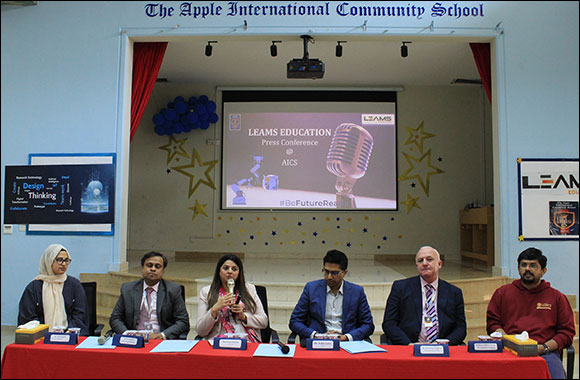UAE-based Leams Education says it has launched a game-changing initiative to introduce coding and robotics in classrooms and labs to prepare students for the future and help them gain access to industry 4.0-led leadership. The skills needed for excellence in the new era.
Leams Education, a future education management company operating schools in the UAE, said it has launched a game-changing initiative to introduce coding and robotics in classrooms and labs to prepare students for the future and help them gain The skills needed to excel in the new era are dominated by the Fourth Industrial Revolution (Industry 4.0 or IR4.0).
Coding and robotics will create a new class of highly employable students who will be well-positioned for top jobs once they graduate. Many of them will also become job creators by launching technology start-ups.
Under the new program, students will receive early courses and hands-on training in coding, robotics, design, machine learning and 3D printing, which will help them prepare for big data analytics, cloud computing, artificial intelligence, the internet as part of the fourth industrial revolution things and digital disruption.
Leams Education, which operates Apple International Schools, Oxford Schools, Indian Colleges and Apple International Community Schools, has been running a pilot project over the past few months.
Today, its management announced the full launch of the program across all its institutions, starting with a new academic session starting in August/September this year.
Regarding the new curriculum, Group Chief Executive Officer Nabil Lahir said: “As a future-focused education management group, we want to prepare our students for the future so they don’t have to struggle later in life to gain the right skills. Learn vital new skills The Fourth Industrial Revolution is transforming the global economy into a digital economy and masters of its own destiny,”
According to Mordor Intelligence, the compound annual growth rate (CAGR) of the global robotics market will increase from $27.73 billion in 2020 to $74.1 billion in 2026, reaching 17.45%.
The use of robots in the UAE is still in its early stages and is expected to pick up in the coming years.
A recent report from Oxford Business Group said automation will put many jobs in the labour market under pressure.
Global management consultancy McKinsey estimates that 42.6% of jobs in the GCC will be automated by 2030, slightly higher than estimates, based on a study of five GCC economies (Kuwait, Oman, Saudi Arabia, Bahrain and the United Arab Emirates). the global average of 32%.
Workers with a high school education or less are most likely to lose their jobs due to 4IR technologies, and around 57% of these workers’ jobs are expected to be replaced by automation by 2030, compared to only 22% with a bachelor’s or graduate degree Bachelor of Science.
Research shows that employees in service, administration, construction and manufacturing are most at risk.
The world is rapidly going digital, and if we don’t change, we will become obsolete in the new world order that emerges from disruption, Rasher said.
“Most jobs are moving to the digital space, and those that are not keeping pace are losing. So if we don’t prepare students for technology, coding and robotics, they are falling behind, which is bad for their future is dangerous,” he said.
The initiative is in line with the UAE government’s Centennial Vision 2071, which aims to make the country future-ready and future-proof, so that its next generation can lead the world through technology and innovation.
According to global audit firm PricewaterhouseCoopers (PwC), AI will add more than $277.1 billion to the GCC countries’ GDP by 2030.
In absolute terms, Saudi Arabia stands to gain the most from AI, adding about $135.2 billion to its economy by 2030. In relative terms, the UAE will be the most affected, with AI contributing 13.6 percent or $96 billion to GDP in 2030, Rahir cited figures.
Early coding, or precoding, provides children with experiences that integrate communication, thinking, and problem-solving. He added that children can be immersed in multifunctional activities that align with areas such as math, problem solving, communication and literacy.













